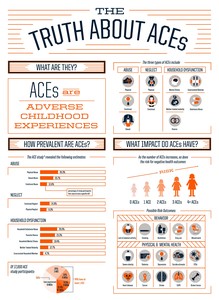
AEF provides links to online interactive training that teaches parents and fmaily members about Adverse Childhood Experiences or ACES and the results of toxic stress that are correlated to later life health outcomes such as substance abuse, depression, drug use, suicide, and domestic violence. AEF also conducts in-person workshops and online educational webinars for organizations, schools and colleges, communities, and parents.
The CDC-Kaiser Permanente adverse childhood experiences (ACE) study is one of the largest investigations of childhood abuse and neglect and household challenges and later-life health and well-being.
The original ACE study was conducted at Kaiser Permanente from 1995 to 1997 with two waves of data collection. Over 17,000 Health Maintenance Organization members from Southern California receiving physical exams completed confidential surveys regarding their childhood experiences and current health status and behaviors.
More detailed information about the study can be found in the links below or in the article, “Relationship of Childhood Abuse and Household Dysfunction to Many of the Leading Causes of Death in Adults
Adverse childhood experiences, or ACEs, are potentially traumatic events that occur in childhood (0-17 years). For example:
Also included are aspects of the child’s environment that can undermine their sense of safety, stability, and bonding, such as growing up in a household with:
Please note the examples above are not a complete list of adverse experiences. Many other traumatic experiences could impact health and well-being.
ACEs are linked to chronic health problems, mental illness, and substance use problems in adolescence and adulthood. ACEs can also negatively impact education, job opportunities, and earning potential. However, ACEs can be prevented.
How big is the problem?
ACEs are common. About 61% of adults surveyed across 25 states reported they had experienced at least one type of ACE before age 18, and nearly 1 in 6 reported they had experienced four or more types of ACEs.
Preventing ACEs could potentially reduce many health conditions. For example, by preventing ACEs, up to 1.9 million heart disease cases and 21 million depression cases could have been potentially avoided.
Some children are at greater risk than others. Women and several racial/ethnic minority groups were at greater risk for experiencing four or more types of ACEs.
ACEs are costly. The economic and social costs to families, communities, and society totals hundreds of billions of dollars each year. A 10% reduction in ACEs in North America could equate to an annual savings of $56 billion.
What are the consequences?
ACEs can have lasting, negative effects on health, well-being, as well as life opportunities such as education and job potential. These experiences can increase the risks of injury, sexually transmitted infections, maternal and child health problems (including teen pregnancy, pregnancy complications, and fetal death), involvement in sex trafficking, and a wide range of chronic diseases and leading causes of death such as cancer, diabetes, heart disease, and suicide.
ACEs and associated social determinants of health, such as living in under-resourced or racially segregated neighborhoods, frequently moving, and experiencing food insecurity, can cause toxic stress (extended or prolonged stress). Toxic stress from ACEs can negatively affect children’s brain development, immune systems, and stress-response systems. These changes can affect children’s attention, decision-making, and learning.
Children growing up with toxic stress may have difficulty forming healthy and stable relationships. They may also have unstable work histories as adults and struggle with finances, jobs, and depression throughout life. These effects can also be passed on to their own children. Some children may face further exposure to toxic stress from historical and ongoing traumas due to systemic racism or the impacts of poverty resulting from limited educational and economic opportunities.
How can we prevent adverse childhood experiences?
ACEs are preventable. To prevent ACEs, we must understand and address the factors that put people at risk for or protect them from violence.
Creating and sustaining safe, stable, nurturing relationships and environments for all children and families can prevent ACEs and help all children reach their full potential. CDC has produced a resource,
Preventing Adverse Childhood Experiences (ACEs): Leveraging the Best Available Evidence
Here are some resources for ACEs and Resiliency education and teaining needed to reduce and mitigate toxic stress.
CDC- https://www.cdc.gov/violenceprevention/aces/resources.html
PACE CONNECTIONS-
https://www.pacesconnection.com/g/northeast-fl
NCTSN- NATIONAL CHILD TRAUMATIC STRESS NETWORK- https://learn.nctsn.org/
Harvard University Center for Childhood Development-
https://developingchild.harvard.edu/guide/a-guide-to-toxic-stress/
Office of Early Intervention- https://www.acesonlinelearning.com/
VITO Violence CDC- https://vetoviolence.cdc.gov/apps/main/tools-and-trainings
